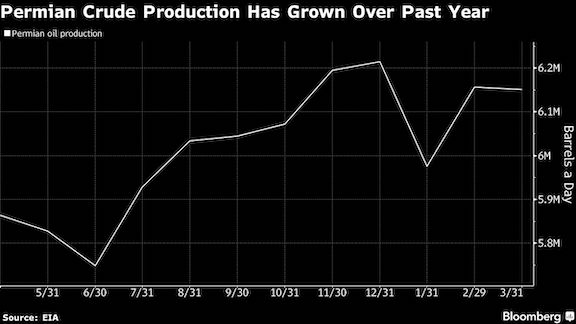Canada’s Gibson Energy Inc. is betting that swelling oil output in the Permian Basin will fuel continued growth in US crude exports, boosting profit from a major Gulf Coast terminal it bought last year for about $1.1 billion.
The acquisition of the South Texas Gateway Terminal — which expanded Gibson beyond its core business of storing and processing Canadian crude in Alberta and Saskatchewan — is seen by analysts as a key earnings driver for the company. While Gibson has plans to generate more revenue from the terminal through physical improvements and enhanced contracts, the deal is also a macro bet on growing US oil exports.
On that front, Chief Financial Officer Sean Brown sees analysts growing more bullish on long-term oil production from the Permian, even after consensus forecasts for the region’s daily output have risen as high as 7 million barrels from a previous expectation of roughly 6.5 million.

“We think that will certainly translate into the export dynamic,” Brown said during an interview last week at the Bank of Montreal and Canadian Association of Petroleum Producers Energy Symposium in Toronto. “We think the US will continue to increase their exports as they look to satisfy global crude demand that continues to go up.”
The outlook for Permian output has been buffeted by well-productivity questions and drillers’ plans to dial back growth and return more cash to shareholders. The field is expected to yield about 6.17 million barrels a day in May, according to US government estimates. That’s down from a peak of 6.22 million in December, but still double what it was churning out a little more than six years ago.
Gibson’s Gateway facility draws oil from the Permian and Eagle Ford basins and loads it onto very large crude carriers for export, with a permitted capacity of 1 million barrels a day. The operation was the second-largest US oil export terminal by capacity and accounted for about 12% of US exports in 2023 leading up to the announcement, Gibson said at the time of the deal.
Gibson is working on selling additional loading windows to bring the facility from about 80% contracted up to the industry standard of about 90%, and trying to shift the contracting mix to more VLCCs from smaller Aframax ships, which would increase volumes flowing through the terminal, Brown said. The company also sees an opportunity to increase storage at the site and dredging to deepen the waterway, he said.
“We are very bullish on our ability to continue to grow the facility,” Brown said. “We see a significant pathway for what we think is attractive growth in the relatively near term.”

Follow us on social media: